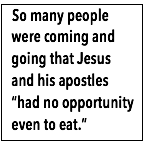|
In his youth, a Jesuit friend of mine was an actual
shepherd out in the fields. I asked him what it was like.
I suppose my ulterior motive was about our readings today,
all of which have references to shepherds.
My friend surprised me. He said he had hated being a
shepherd and would never want to go near it again. Why?
Because today there are huge numbers of sheep in a herd,
and you could never know which was which, much less have
names for them. Sheep-dogs could keep them more or less
together in a herd, not the shepherd. The job was cold,
uncomfortable, and unrewarding.
What a surprise. Seems like the exact reversal of what we
hear in the Bible.
 And, my Jesuit companion does not qualify for being a
“bad shepherd” at all. He has been a wonderful
shepherd of people since that time. And, my Jesuit companion does not qualify for being a
“bad shepherd” at all. He has been a wonderful
shepherd of people since that time.
Today the tending of sheep is an industry, not something
personal. When Jesus was alive, the shepherd could name
each sheep and each one knew his voice by heart, much like
the family dog knows your voice. Good shepherds would
search and search for one lost sheep. Or if one was turned
absurdly on its back, unable to roll over again because of
its full fleece, the shepherd would take his
“crook,” and using the big curve on one end
would easily maneuver that sheep back onto its feet. If
there was real danger, as for instance if wolves were
ready to pounce, the shepherd would take out his
“staff,” a pole-like weapon, and deal with the
predators.
Bad shepherds, on the other hand, would actually scatter
the sheep, as God says in the
First Reading. They would drive sheep away because they were a burden.
The herd feared and trembled, and many went missing.
Sometimes men were hired who were not shepherds at all and
who simply ran away when a wolf approached (Jn 10:12).
Sheep and shepherds were used in the bible as symbols of
God’s people and their rulers. Jesus was the Good
Shepherd in the
Responsorial Psalm, putting himself out for us, the sheep. God’s
anger flamed out against the bad shepherds.
Now look at the
Gospel. So many people were coming and going that Jesus and his
apostles “had no opportunity even to eat.” He
advised the disciples to come away with him to a quiet
place and rest. Even shepherds must take a break. They
went off in a boat to a deserted place.
But the needy throng was clever. They traced where the
boat was going and formed a “vast crowd”! What
should Jesus do, start ministering again instead of
resting? The Gospel says “his heart was moved with
pity for them, for they were like sheep without a
shepherd,” so “he began to teach them many
things.”
God’s words in the First Reading had come true:
“I myself will gather the remnant of my flock … and
bring them back to their meadow.”
The question for you and me is not whether we should go
without food and sleep, and be workaholics for the sake of
others. It is whether our own hearts are ever moved even
once with pity for the scattered and fear-filled sheep of
our own time. Can we love them with Jesus’ love?
Are we good shepherds or bad?
John Foley S. J.
Write me an
email! I'd like to have a discussion with you about
this.
|